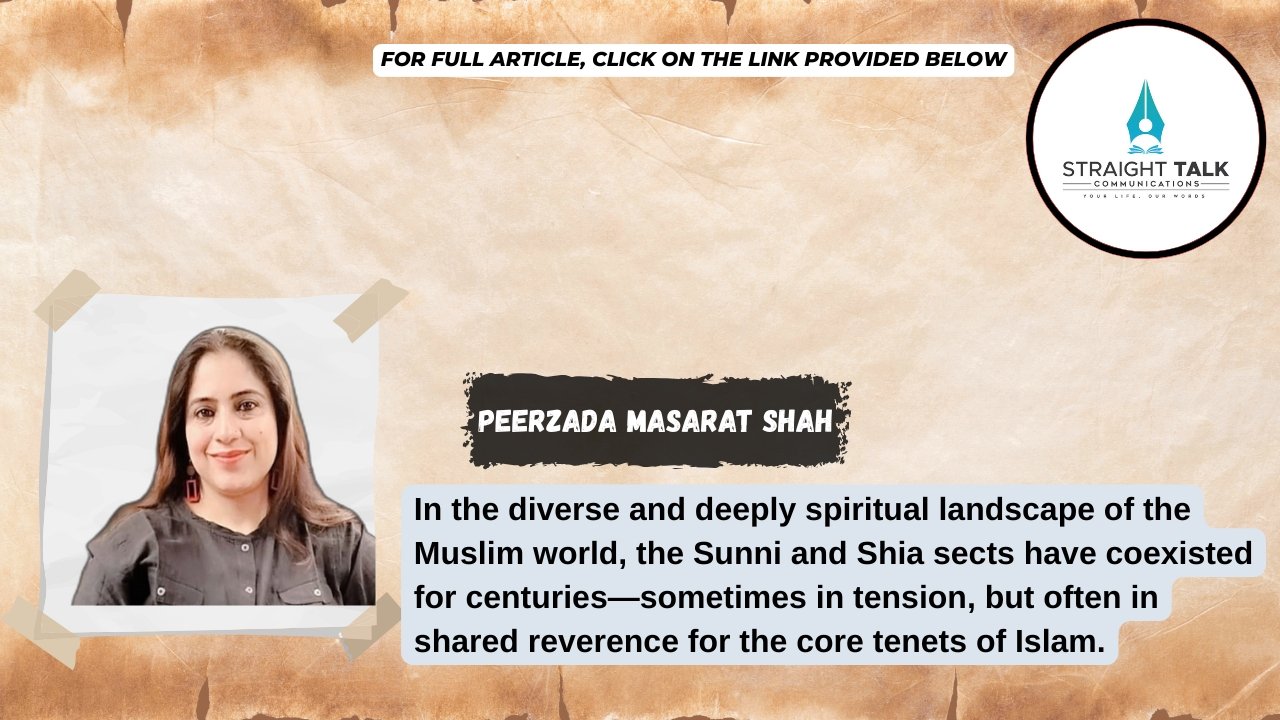Sectarian Provocations and the Duty of Conscience: A Plea for Unity Over Division

Peerzada Masarat Shah
In the diverse and deeply spiritual landscape of the Muslim world, the Sunni and Shia sects have coexisted for centuries—sometimes in tension, but often in shared reverence for the core tenets of Islam. However, the current climate reveals a growing trend of deliberate distortion, where age-old theological differences are being exploited by fringe voices to sow discord, suspicion, and even hatred within the Muslim community.
More concerning than the differences themselves is the way in which inflammatory, ahistorical, and emotionally manipulative narratives are being circulated as divine truth. These tales, often based on fiction rather than fact, do not seek to inform but to inflame. They are wrapped in religious language but serve political or personal ends. And the most unfortunate part? Many fall for them—hook, line, and sinker—often in the absence of informed guidance or responsible leadership.
The real tragedy lies in the silence of those who should speak out. Politicians, clerics, scholars, and public figures who command influence in our communities are either looking away or remaining diplomatically mute, as hate-filled speeches and toxic ideologies creep further into our public discourse. Silence, at such a time, does not denote wisdom—it signifies complicity.
A Dangerous Game of Provocation
Recently, a politically irrelevant figure, long known for courting controversy, has once again resurfaced. Lacking any constructive agenda or public support, he has turned to the oldest trick in the book: stirring sectarian sentiment. Through reckless public speeches, filled with historically inaccurate and deeply offensive remarks, this individual seeks not reform or dialogue, but chaos and notoriety.
This is not freedom of expression—it is calculated incitement. When speech is designed to demean a community, question their loyalty, or provoke communal unrest, it becomes a threat to public order. Kashmir, a region that has long struggled with political turmoil and socio-religious fragility, cannot afford such provocations.
Where Are the Voices of Reason?
At this critical juncture, silence from influential figures is more damaging than words. Sajad Lone, a prominent political personality with a strong base in the valley, has notably chosen not to comment on the situation. His reticence, given the gravity of the moment, is disheartening. Leadership is tested not in moments of comfort but in times of controversy. To remain neutral now is to fail the very people who look up to leaders for moral clarity.
This silence sends a dangerous message—that sectarian speech is tolerable, even acceptable, so long as it serves political ends or avoids controversy. We must demand better. Leaders must rise above politics and condemn all attempts to divide communities on religious grounds.
Law and Order Cannot Remain Passive
The individual at the center of this storm is not merely provocative—he is a danger to peace and social cohesion. His speeches, widely circulated online and offline, show a clear intent to polarize. It is the duty of the state and law enforcement agencies to act—swiftly and judiciously. Legal action, under existing laws against hate speech, must be pursued. Additionally, if the individual is found to be mentally unstable, then appropriate psychiatric evaluation must be conducted. Inaction risks emboldening others to follow suit, creating a ripple effect of unrest.
The Role of Religious Voices
Amidst this storm, there are still voices of reason. A respected Sunni preacher recently emphasized the importance of exercising caution in expressing deeply sensitive theological views in public. “Such matters, if voiced carelessly, can deeply wound the faith of others. Our reverence for the Sahabah is not optional—it defines our belief system,” he said.
This is not a call for suppression, but a reminder that wisdom often lies in restraint. In contrast, some youth, frustrated with recurring provocations, demand harsh penalties for religious leaders who stir division. While their anger is understandable, the solution does not lie in silencing or punishing clerics indiscriminately, but in strengthening responsible religious education and dialogue.
A Shared Future Requires Mutual Respect
We must understand that sectarian peace is not the absence of difference, but the presence of respect. Shia and Sunni traditions have theological disagreements—but these are matters for academic debate and inter-sectarian engagement, not weapons to be wielded in public forums to earn applause or provoke outrage.
We are united in our belief in Allah, His Messenger Muhammad (PBUH), the Quran, the Day of Judgment, and countless other pillars of faith. These shared values far outweigh our disagreements.
Let the community—and its leaders—be firm in rejecting those who weaponize faith for political ambition or personal gain. The media must act with editorial responsibility, and social media platforms must monitor and curb the spread of content that incites sectarian hatred.
Kashmir’s Legacy Demands Better
Kashmir has long prided itself on a culture of pluralism, tolerance, and Sufi spirituality. We cannot allow a few toxic voices to undo generations of coexistence. Let us remember that history will judge us not by what we believed privately, but by how we responded publicly when our unity was tested.
We must stand together—not as Shias or Sunnis, but as Muslims committed to peace, justice, and mutual respect. Let us be vigilant in guarding our community from division, but never vengeful. And above all, let us refuse to be pawns in anyone’s game of hate.







